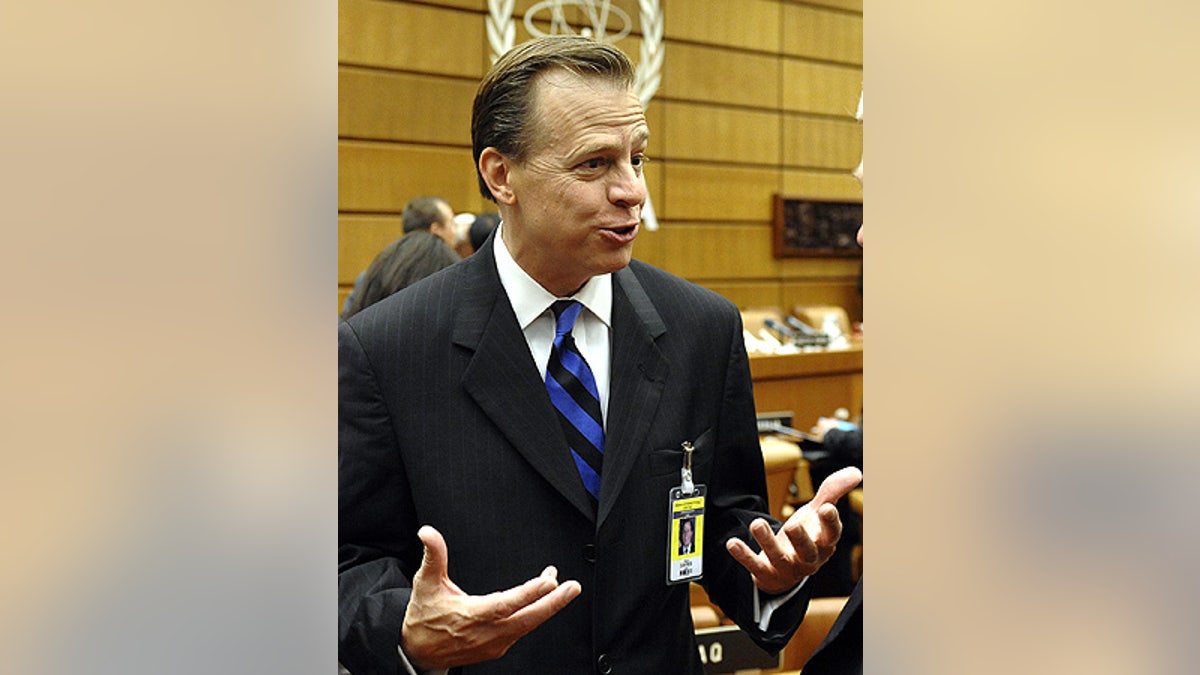
Sept. 7: Glyn Davies, U.S. Ambassador to the IAEA, is seen before a 35-nation board meeting in Vienna. (AP)
VIENNA – The United States said Wednesday that Iran was moving closer to being able to produce a nuclear bomb by stockpiling enriched uranium and, along with European allies, urged Tehran to engage in talks over its atomic program.
"Iran is now either very near or in possession already of sufficient low-enriched uranium to produce one nuclear weapon if the decision were made to further enrich it to weapons-grade," Glyn Davies, Washington's chief envoy to the International Atomic Energy Agency said. "This ongoing enrichment activity ... moves Iran closer to a dangerous and destabilizing possible breakout capacity," he said.
The latest agency report says Iran now has, at a minimum, 3,153 pounds of low-enriched uranium hexafluoride, he added.
"Taken in connection with Iran's refusal to engage with the IAEA regarding its past nuclear warhead-related work, we have serious concerns that Iran is deliberately attempting, at a minimum, to preserve a nuclear weapons option," Davies told a meeting of the U.N. nuclear watchdog's 35-nation governing board.
Earlier this year, the U.S. national intelligence chief said Iran probably lacked the technical ability to "weaponize" enrichment before 2013.
President Barack Obama and European allies have given Iran until the end of September to take up an offer of nuclear talks with six world powers and trade incentives should it suspend uranium enrichment activities. If not, Iran could face harsher punitive sanctions.
Iran insists the program is peaceful and aimed at generating electricity. Others contend it is covertly trying to build a bomb.
On Monday, Iranian President Mahmoud Ahmadinejad said his country will neither halt uranium enrichment nor negotiate over its nuclear rights but is ready to sit and talk with world powers over "global challenges."
In Vienna, Davies stressed that Iran — in contrast to its claims — is far from addressing all of the IAEA's concerns.
"We, as members of the board, have a responsibility to demand that the (IAEA) secretariat's questions are answered and to ensure that we can obtain confidence in the peaceful intent of the Iranian nuclear program," Davies said. "When a state such as Iran continues to violate its obligations, we must respond."
But Davies also said the U.S. welcomes constructive, honest engagement with Iran to resolve the issue and added he hoped that Tehran will take "immediate steps to restore international trust and confidence."
"The pathway to a negotiated solution remains on the table for Iran, and we continue to call on Iran's leaders to demonstrate genuine commitment to peace and security in the Middle East and to the international nonproliferation regime," he said.
Britain, France and Germany joined Washington's call, urging Iran to engage in "meaningful negotiations" aimed at achieving a comprehensive diplomatic solution to the international standoff over it's disputed nuclear program.
The three major European powers said it was "inexcusable" that Iran continues to refuse any degree of transparency or cooperation in clarifying outstanding issues and that it's current attitude further reinforces doubts about its endeavor.
"Iran should make use of the window of opportunity provided now," said the joint statement, delivered by German envoy Reedier Luedeking. "We have extended a hand and we appeal to Iran to take it."
On Monday, IAEA chief Mohamed ElBaradei, said his watchdog was locked in a "stalemate" with Iran and urged Tehran to "substantively re-engage" with the Vienna-based organization to prove there are no military dimensions to its nuclear program.
The Associated Press contributed to this report.
